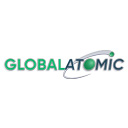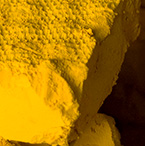Rising Demand Positions Global Atomic's Dasa Uranium Project Amid Financing Progress & Strong Government Support

Global Atomic advances Niger uranium project amid rising demand. Strong gov't support, financing progress, and unique market position
- Global Atomic Corporation's CEO Stephen Roman discusses the company's uranium mining project in Niger, which is progressing on schedule with earthworks completed and an acid plant ready for shipment.
- The company has received strong support from the Niger government, including a letter from the president directing all government departments to support the project.
- Financing discussions are ongoing, with DFC approval expected by the end of Q4. The company is also exploring joint ventures and other financing options.
- Despite recent political changes in Niger, relations with the US remain positive, and the border with Benin is expected to reopen soon, which will improve logistics.
- CEO Stephen Roman notes that uranium fundamentals remain strong despite recent stock price declines in the sector, and he sees this as a potential opportunity for investors.
Global Atomic Corporation (TSX:GLO) is making significant strides in developing its Dasa uranium project in Niger, positioning itself as a key player in the growing nuclear energy sector. As the world increasingly turns to nuclear power as a clean energy solution, Global Atomic's progress in bringing a new uranium mine online draws attention from investors and industry observers alike. This article examines the company's recent developments, challenges, and potential opportunities for investors in the uranium market.
Dasa Project Development Progress
Earthworks & Infrastructure
Global Atomic's Dasa project is advancing steadily, with CEO Stephen Roman reporting substantial progress. The company has completed earthworks for the acid plant area, a crucial component of the uranium extraction process. Roman states:
"Our earthworks are now complete for the acid plant area, so silos will be starting there. The acid plant is now completed fabrication, so it's in containers ready to be shipped."
This milestone indicates the project is moving from the planning stage to tangible infrastructure development.
Underground Development
In addition to surface preparations, Global Atomic is making significant headway in underground development. Roman explains:
"We've now got material on surface ore, but we must now provide adequate ventilation for continued underground development."
To achieve this, the company has initiated a significant drilling operation to create two ventilation shafts – one downcast and one upcast. This work is critical for ensuring safe and efficient mining operations as the project progresses towards production.
Workforce & Local Impact
The scale of the Dasa project is evident in its workforce numbers. Roman reveals, "We've got about 450 [people] right now, so it's a small town in place there."
This significant employment figure demonstrates the project's complexity and highlights its potential economic impact on the local community. The creation of jobs and associated economic activity is likely to strengthen Global Atomic's relationship with local stakeholders and the Niger government.
Interview with Chairman, President & CEO Stephen G. Roman
Government Support & Political Landscape
Niger Government Backing
One of the most crucial factors for mining projects in developing nations is government support, and Global Atomic appears to have secured strong backing from Niger's authorities. Roman shares a significant development:
"We've just recently received a letter from the president, and he copied his entire council, supporting the project. He's directed everyone in the government to support this project."
This high-level endorsement provides a layer of political security for the Dasa project and may help streamline bureaucratic processes.
Regional Political Dynamics
Recent political changes in Niger have raised questions about the stability of foreign investments in the country. However, Roman provides a nuanced view of the situation, particularly regarding relations with key international partners like the United States. Roman notes:
"The US, I would say, has good relations with Niger. Clearly, they're working on our project as well. The embassy's very engaged with the government of Niger."
This ongoing engagement suggests that despite political shifts, there is continuity in Niger's approach to foreign investment in strategic sectors like uranium mining.
Logistical Considerations
An important development for the project's logistics is the expected reopening of the border between Niger and Benin. Roman explains the significance:
"The government needs the revenue. Orano's Somair operation in the north has stockpiled yellowcake there. They want that border open so they can move it."
Reopening this border would greatly facilitate the transport of materials and equipment for the Dasa project, potentially reducing costs and timelines.
Financing & Market Dynamics
DFC Financing Progress
A critical component of Global Atomic's strategy is securing financing through the U.S. International Development Finance Corporation (DFC). Roman provides an update on this process:
"We understand from our discussions that we should have that completed by the end of Q4. The board meeting and the approval to go ahead."
While delays have occurred due to various factors, including permitting issues and regional political events, the potential DFC backing remains a significant catalyst for the project's advancement.
Alternative Financing Options
While DFC financing is a primary focus, Global Atomic is also exploring other avenues. Roman mentions:
"We have a couple of JV discussions. There are groups interested in joining the project. We have some other options as well."
This multi-pronged approach to financing demonstrates the company's flexibility and could provide additional paths to fund the Dasa project's development fully.
Uranium Market Dynamics
The uranium market has experienced volatility, with prices rising but uranium equities facing pressure. Roman observes:
"The market needs to realize that the term prices have continued to increase, and we're now at $80. A good 18 months ago, it was $35."
This disconnect between commodity prices and stock valuations presents both a challenge and an opportunity for sector investors.
Utility Interest & Contract Negotiations
Global Atomic is actively engaging with utility companies, the end-users of uranium fuel. Roman notes:
"The utilities that we've signed deals with obviously all want updates on what's happening. Other utilities we're meeting with here are watching. They're still on the fence. They don't want to sign deals until the financing is complete."
This cautious approach from utilities underscores the importance of securing project financing to unlock potential long-term contracts.
Competitive Landscape & Market Positioning
Global Atomic's Dasa project holds a distinctive position in the uranium market. As Roman emphasizes, "This is the only greenfield project in the world. It's unbelievable."
This status as the sole new uranium mine being developed from scratch potentially gives Global Atomic a significant advantage in meeting future demand growth.
The company is building valuable expertise through the development of the Dasa project. Roman suggests this could become an asset in itself: "Once we finish this project, because there's really a lack of people that have ever built a uranium project out there, maybe we can hire out our services to build the next one."
This accumulation of specialized knowledge could position Global Atomic as a leader in uranium project development beyond its current asset.
Challenges & Risk Factors
Despite strong fundamentals in the uranium market, Global Atomic, like many of its peers, has faced significant stock price volatility. This volatility highlights the importance of a long-term investment perspective when considering uranium sector investments.
While the company has strong government support in Niger, the broader geopolitical landscape in the Sahel region presents ongoing risks. Investors must consider the potential for political changes or regional instability that could impact project development or operations.
Global Atomic Corporation is making tangible progress in developing its Dasa uranium project in Niger, supported by strong government backing and advancing towards key milestones in financing and development. The company's unique position as the developer of the only new greenfield uranium mine globally, combined with rising uranium prices and growing nuclear energy demand, presents an intriguing opportunity for investors in the clean energy space. However, challenges remain, including market volatility and geopolitical considerations, which investors should carefully weigh against the potential rewards of participating in a new source of uranium production.
As the global energy landscape continues to evolve, with increasing emphasis on low-carbon power sources, Global Atomic's progress at Dasa bears watching for those interested in the intersection of mining, energy, and frontier market development.
The Investment Thesis for Global Atomic
- Claimed to be the only new greenfield uranium project globally, positioning the company to meet growing demand
- Strong government support in Niger, reducing political risk
- Advanced stage of development with key milestones approaching (financing, construction)
- Potential for long-term utility contracts once financing is secured
- Expertise being developed could lead to additional value creation beyond the Dasa project
- Current market volatility may present attractive entry points for long-term investors
- Exposure to rising uranium prices and growing nuclear energy demand
Macro Thematic Analysis
The global push for clean energy solutions has reignited interest in nuclear power, driving a resurgence in the uranium market. Several key factors underpin this shift:
- Climate Change Mitigation: Governments worldwide are setting ambitious carbon reduction targets, leading to a reevaluation of nuclear energy as a reliable, low-carbon power source.
- Energy Security: Recent geopolitical events have highlighted the importance of energy independence, with nuclear power offering many countries a stable, domestic energy option.
- Technological Advancements: The development of safer, more efficient reactor designs, including small modular reactors (SMRs), is expanding the potential applications of nuclear energy.
- Supply-Demand Imbalance: Years of underinvestment in uranium production and growing demand have created a tight market that supports higher uranium prices.
- Policy Support: Many countries are extending the life of existing nuclear plants and planning new builds, signaling long-term commitment to nuclear energy.
However, challenges remain, including public perception of nuclear energy, regulatory hurdles, and the need for significant capital investment in new projects. Additionally, the long lead times for mine development and reactor construction mean that supply-demand dynamics can shift during project lifespans.
The company's Dasa project, as the only new greenfield uranium mine in development globally, is uniquely positioned to capitalize on this shifting landscape. Both Global Atomic's unique position in the market and the broader scarcity of new uranium supply coming online highlight the potential significance of the Dasa project in meeting future global uranium demand.
Analyst's Notes




Subscribe to Our Channel
Stay Informed












































